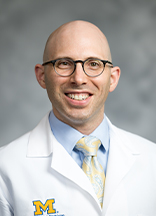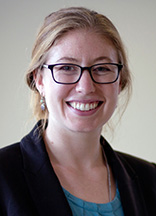 Stephen Goutman, M.D., M.S.
Stephen Goutman, M.D., M.S.An ALS Association grant will help Stephen Goutman, M.D., M.S., associate director of the University of Michigan (U-M) ALS Center of Excellence, answer the most common question asked by patients suffering from amyotrophic lateral sclerosis (ALS) – “why me?” Dr. Goutman’s research has shown an association between environmental pollutants and ALS development and progression. The new ALS Association funding will allow Dr. Goutman to jointly consider genetic factors and environmental exposures over the next three years.
“Our research at the ALS Center of Excellence over the past few years has been building to this detailed examination of the gene-time-environment model,” said Dr. Goutman, who is a U-M associate professor of neurology. “Every person is impacted differently by the environment based on their genes and how their body metabolizes pollutants. We hypothesize that people who have both higher ALS genetic risk and environmental exposures will be shown to have a higher risk of developing ALS and a faster progression of the disease.”

The grant will be co-directed by Kelly Bakulski, Ph.D., U-M assistant professor of epidemiology. By understanding how exposure to pollutants like pesticides and industrial chemicals affects a person’s genes, Drs. Goutman and Bakulski plan to develop new targets for drug treatments. Additionally, their research will likely identify life changes that people can make to reduce their susceptibility to ALS.
“Dr. Goutman and I are passionate about defining the links between ALS, the environment and genetics,” said Eva Feldman, M.D., Ph.D., director of the U-M ALS Center of Excellence. “Thanks to the research partnership we have with our patients in the Multidisciplinary ALS Clinic, we already have a great deal of information stored in our biorepository that will help with this new study. I am very excited to see what the results will tell us about why Michigan has the highest prevalence of ALS compared to other states in the US.”
Though the exact causes of ALS are unknown, Drs. Feldman and Goutman’s research published earlier this year in the Journal of Neurology, Neurosurgery & Psychiatry showed that legacy organochlorine pesticides and other environmental pollutants advance the progression of the neurodegenerative disease. The study measured pesticide levels in blood samples of ALS patients cared for at the U-M Multidisciplinary ALS Clinic.
In March 2019, the Detroit Free Press reported on ALS environmental risk factors: New study: Michigan’s manufacturing legacy may be affecting our health, environment
Other research from Stephen Goutman, M.D., M.S.:
